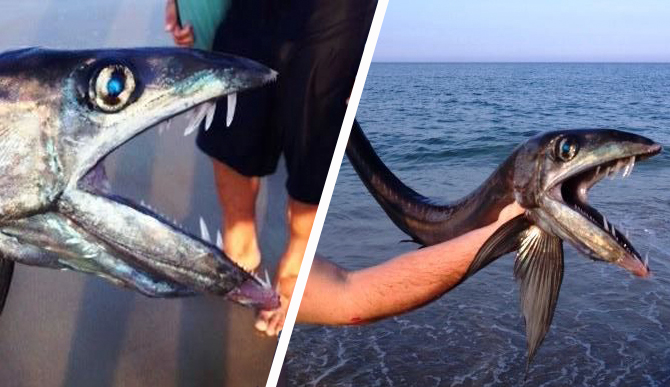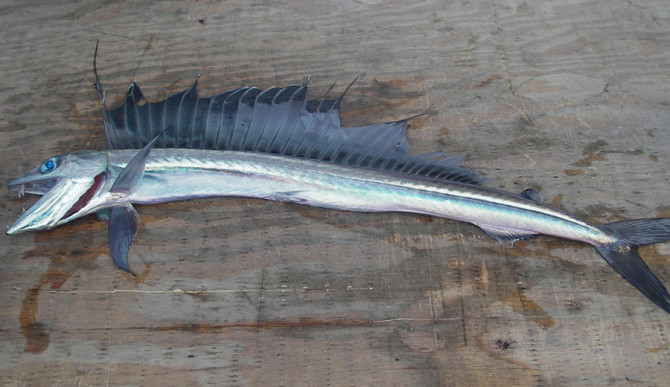
Looks kind of like a creature that wouldn’t mind gnawing on its own kind, doesn’t it? Photo: Jenette’s Pier
Back in high school, me and my friends absolutely loved giving each other a hard time. Now, I’m not talking farts and ball-taps. Our pranks involved heavy sharpie usage before church with the family, “misplaced” cars, and gnarly gut punches or painful ear tweaks — we were bored in the Heartland (I grew up in Kansas City), and apparently violent. Many times the recourse was even more brutal, taken to a whole other level. While we were undoubtedly palling around with each other as kids do, there was a ferocity in revenge that, looking back, verged on dangerous. Shoves from second stories into precariously far pools, or publicized photographs that we only now are realizing the repercussions for. But we never took bites out of one another. And today, in that, I find solace.
On May 15, Jenette’s Pier posted a handful of pictures of a lancetfish that washed ashore to their Facebook page. Lancetfishes are basically scary as sh*t: they are nocturnal predators with large fangs and tall dorsal fin — who happen to have no problem whatsoever eating their own kind. They also eat crustaceans, squid, and smaller species of fish, but their diet largely consists of themselves. Talk about a dog-eat-dog… or rather fish-eat-fish world. The funniest part in all this — if there is indeed humor in cannibalism — is that they are, in turn, preyed upon by seals, sharks, and other large fish, such as tuna. C’mon! Seals? Thought eating your own species made you crazy, the sort of crazy the would encourage Flipper to avoid you.
Anyway, these lancetfishes are of the genus Alepisaurus, which translates to “scaleless lizard” and is the only living genus in the family Alepisauridae. Growing up to about six or seven feet, they are found in the far reaches of most oceans, with the exception of polar seas. There is not much known about their biology or life cycle, however it is known that as adolescents, they are hermaphrodites, a trait found much less in adults. So, yeah, something happens. Also called the handsaw fish, they have no scales, and are instead covered in pores, upping the “ick” factor. Needless to say, they’re not very tasty, as many a tuna fisherman would attest.
The scariest part may not be that it it is a cannibalistic fish, or that this particular one was still alive, but that it was beached, meaning it found its way close enough to shore to get beached. Scientists speculate that this long-snouted lancetfish was likely sick — it was released back into the water, only to wash back up to shore again — though it should be noted that this is yet another deep sea diver what is becoming a trend of fish out of (their own) water, thousands literally out of water. Feels like a trend we should be paying attention to.


